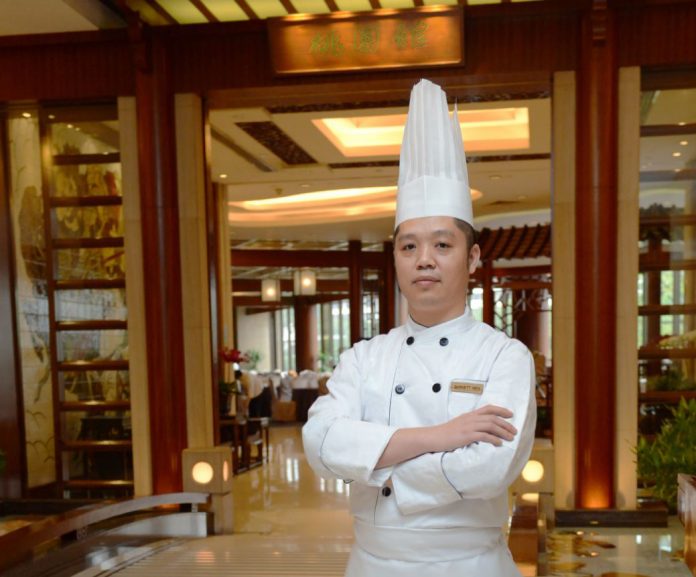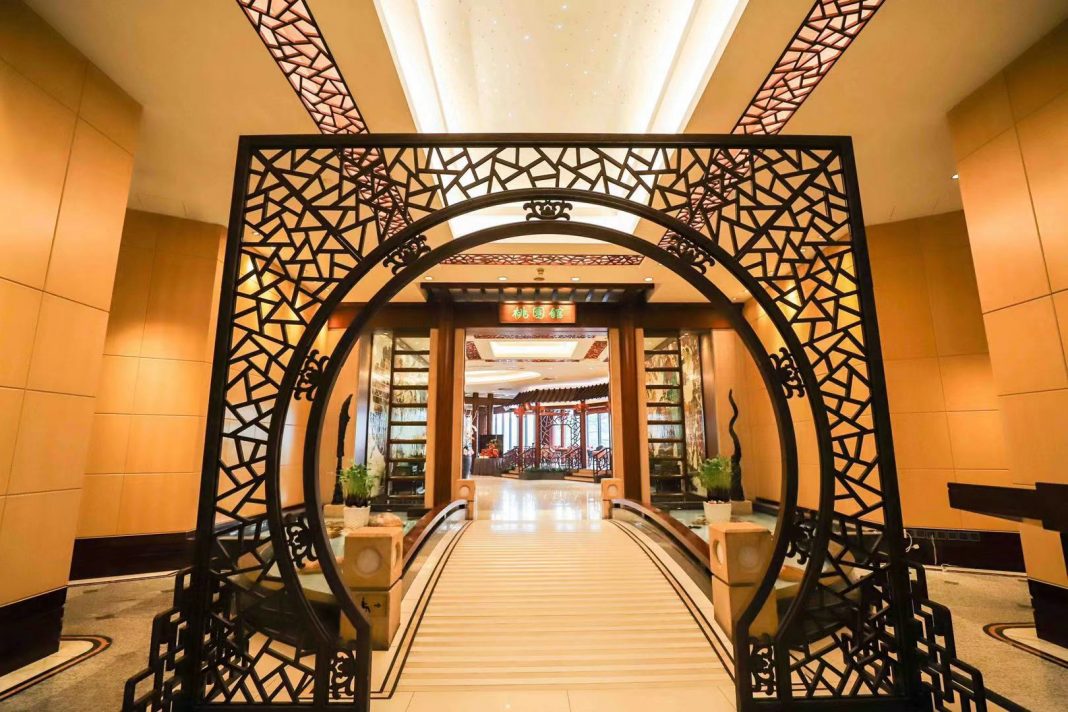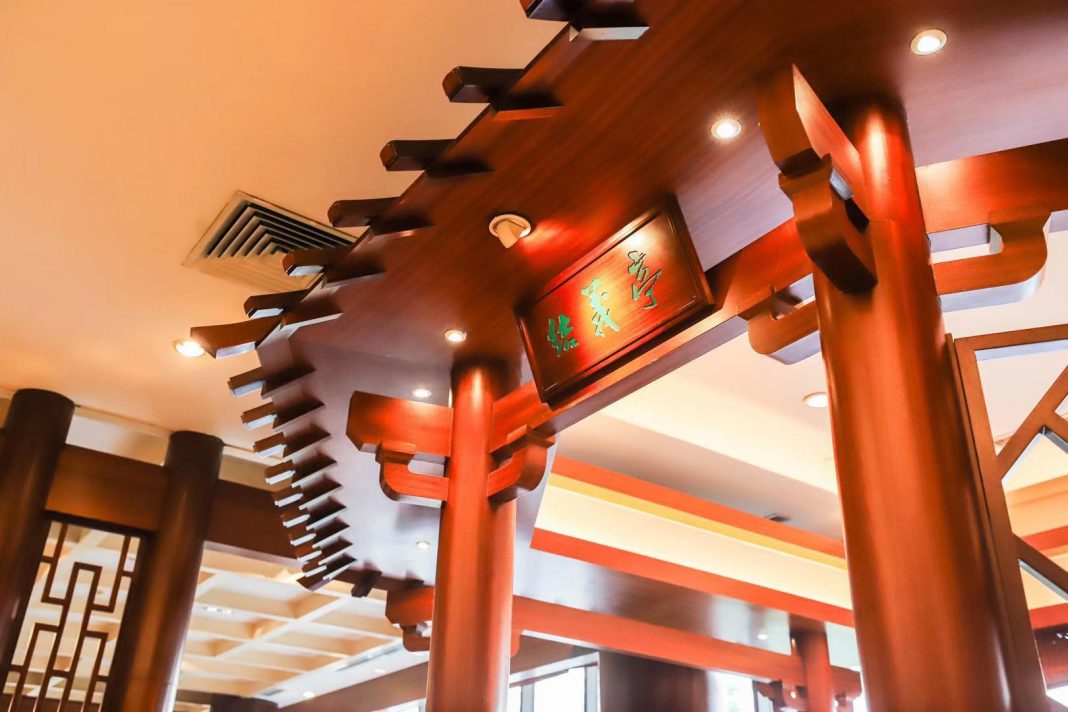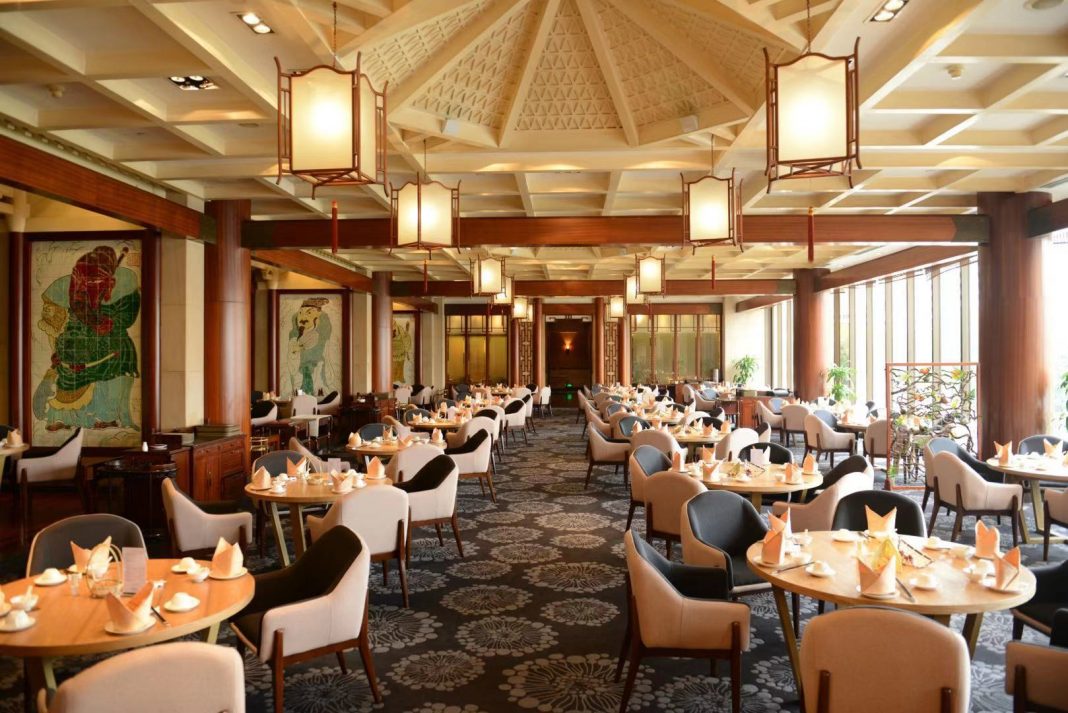
与花园酒店的结缘
A History with The Garden Hotel
从2012年开始,温思恩就在花园酒店担任中餐行政总厨。事实上,早在2003年,温思恩就曾在花园酒店任职。
In 2012, Wen Sien was hired as the executive chef of Chinese food at the Garden Hotel. This was Wen Sien’s second time working at the hotel as he was hired back in 2003.
与花园酒店再次结缘,对于温师傅来说是一个更大的平台,这时的他已在外见识甚广,了解到不同地区的菜式,而花园酒店无论是地理位置还是历史文化都吸引着无数的老广和各地游客,他可以在这里尽情地发挥粤菜的创新精神。
When Chef Wen returned to The Garden Hotel in 2012, he returned with a vast new knowledge of food from different regions. The Garden Hotel attracts numerous tourists from all over the world thanks to its unique location, history and culture. Chef Wen has thus been able to use The Garden Hotel as a platform to innovate Cantonese cuisine to appeal to its international visitors.
传统与创新碰撞
Where Tradition Meets Innovation

“粤菜创新,就是一理通百理明”。温师傅要面对的是更新一代的食客,“八年前,广州消费比较高,我们经常做的是燕鲍翅肚;八年后的今天,客人变得理性消费,更讲究新的口味和摆盘。所以,就需要我们在传统的基础上去进行创新。”
Chef Wen is known for his innovative take on traditional Cantonese cuisine. The chef says of his unique vision in the kitchen: “The innovation of Cantonese cuisine means getting effect as long as knowing rules and tricks”.
Speaking about his new generation of diners, Mr. Wen adds: “Eight years ago, the consumption level in Guangzhou was high, and the usual dish we made was abalone, shark’s fin and fish maw. Eight years later, guests have become more interested in new flavors and dishes. Subsequently, we need use tradition as a foundation for innovation.”
而在外地工作过的见识与阅历,也给温师傅的菜品创新带来更多灵感。
Chef Wen’s experiences working abroad has provided inspiration for his food innovation.
例如花园酒店颇受欢迎的“金汤”,就是温师傅参考了福建“佛跳墙”的烹调方法,用甘笋提炼的甘笋油来烹制,成品色泽金黄,口味清香,老少皆宜。
The Garden Hotel’s popular “Golden Soup” dish, for example, has been inspired by Chef Wen’s time in the Fujian Province. He refers to the cooking method of “sea food and poultry in casserole”. The soup is cooked using carrot oil extracted from carrot. The finished product is golden in color and fragrant in taste. The Golden Soup is enjoyed by guests of all ages.
作为一名厨师,他懂得如何去捕捉和呈现不同的风味,围绕这几点,不断的去延伸,将自己的创意融会贯通。
As a chef, Chef Wen understands how to capture and present different flavors. In this area, he continues to expand and integrate his ideas in new ways.
传统粤菜的精髓
The Essence of Cantonese Cuisine
所谓“一方水土养一方人”,要让粤菜在各个城市受到欢迎,温师傅强调:“一定要根据当地特色去进行变通。”
It is often said that “people from different places have different cultures”. Chef Wen uses this philosophy as a foundation for his understanding of Cantonese cuisine. He adds: “It has to be tailored to the local context.”
“例如宁波是偏清淡的,武汉偏爱浓口,四川则重麻辣……”温师傅说,每到一个城市,他最先要做的,就是去了解当地的口味和食材。
The chef continues: “For example, the Ningbo people prefer light taste, the Wuhan people prefer the strong taste, and the Sichuan people prefer spicy taste…” Every time Chef Wen visits a city, he attempts to understand the local tastes and ingredients.
比如“捞菜排骨”,是用湘菜的烹制方法焖出辣味排骨,再与粤北山区的酸菜结合,酸辣开胃,引人垂涎。
Take the “Braised Pork Chops”, for example. This dish uses a cooking method integral to Hunan cuisine. The flavor is a combination of spicy ribs and pickled vegetables in the northern mountains of Guangdong Province. The dish is often described by guests as “mouthwatering.”
又比如“金蒜一口牛”,温师傅选用了山东济宁的独子蒜来搭配谷饲澳洲牛肉,这种蒜个头大,没有一般蒜头的辛辣味,口感粉软,既为牛肉增味增香,又可作为解腻的配菜食用。
Another example is the “Fried Beef with Cispy Garlic”. For this dish, Chef Wen deliberately selected white garlic from Jining, Shandong Province to be paired with Australian beef. This large garlic does not have the pungent taste of regular garlic but is instead soft and powdery. This choice not only increases the flavor and fragrance of the beef, but the white garlic can also be enjoyed as a side dish.
洋为中用
Adapting Foreign Tastes for Chinese Use

在菜品创新上,温师傅强调,要“洋为中用”。
In the innovation of dishes, Chef Wen stresses the importance of “adapting foreign things for Chinese use”.
“其实很多中式菜品,可以结合一些外国的烹饪手法或者调料去做。”
He clarifies: “In fact, many Chinese dishes can be done with some foreign cooking techniques or spices.”
比如“香茅梅柳叉烧”,温师傅是采用东南亚的香茅,来搭配粤菜中常见的叉烧,用这种方法去呈现这道粤式经典菜肴,就受到了很多外国客人的喜爱,“因为他们在这道菜里,既能品尝到地道的粤式风味,又完全不用担心口味差异的问题。”
The “Citronella Barbecued Pork” is a great example of this. Chef Wen combines citronella from Southeast Asia with the common barbecued pork of Cantonese cuisine. When presented in this unique way, the classic Cantonese dish is popular among many foreign guests.
Chef Wen explains: “Because they are able to taste the Cantonese style of the dish, and they don’t have to worry about the difference in taste.”
桃园馆的独到之处
The Unique Placement of Taoyuan Restaurant
广州花园酒店三楼的桃园馆,拥有超过31年历史,为城中首屈一指的高级粤菜食府,不管是经典粤菜还是特色点心,精致地道的出品一直深受广大食客的喜爱。餐厅的设计以三国时代“桃园三结义”故事为背景,内部装饰清新典雅,具有浓郁的中国传统文化气息。桃园大厅坐拥整个前花园景色,餐厅内还设有8个以三国时代的历史人物命名的贵宾厅房,如大乔、小乔、张飞、刘备等。作为城中最好的中餐厅代表,不断为食客用心呈现多款经典粤菜及精致名点,搭配新奇健康,口味丰富独特。
Taoyuan Restaurant is located on the third floor of Guangzhou Garden Hotel. It is renowned as one of the leading top-level Cantonese restaurants in the city and has a history of more than 31 years. The menu items range from classic Cantonese dishes to unique snacks. The delicate authenticity of each item is always appreciated by diners.
The interior of the restaurant is based on the background of the “Taking Oath in the Peach Garden” in the Three Kingdoms era. The design is fresh, elegant, and a tribute to traditional Chinese culture. Better still, the Taoyuan Restaurant has a stunning view of the entire front garden. There are also eight VIP rooms named after the history of the Three Kingdoms. VIP guests can choose to dine in the Daqiao, Xiaoqiao, Zhang Fei and Liu Bei rooms, among others. As the best representative Chinese restaurant in the city, Garden Hotel continues to present a number of classic Cantonese dishes and exquisite name points in ways that are novel, healthy and unique.
永远不断奋进
Always Striving Further

温师傅常常会为客人堂做菜品,与客人面对面互动,以了解菜品是否符合客人所需;每日临近收市,温师傅都会从工作区走出来,直接向客人询问意见。扎实的厨艺根基,源源不绝的创新灵感,时刻掌握客人所需,这是温师傅每天对自己的严格要求。
Chef Wen interacts with his guests face-to-face to ensure that his dishes meet their expectations. At the end of each day, Chef Wen leaves his working station and asks guests for their feedback. Chef Wen’s three strict daily requirements for himself are: a solid cooking foundation; an uninterrupted innovative inspiration, and “know the needs of the guests”.
“多做,多经历。”温师傅说。“就好像烤炉的温度到底有多高,你只有多经历才知道,把手放在烤炉5厘米上方,约5秒就要抽回手,说明达到了150度,但这些你必须亲自体验过才知道。”
Mr. Wen summarises his attitude to cooking when he says: “do more, and experience more.”
“For example, you only know how high the temperature of the oven is after experiencing it,” the chef explains. “When you put your hand 5 cm above the oven, you will be able to pull back in about 5s, which is 150°. But you have to experience it before you know it.”
温师傅有一句话给大家:“做厨师,除了要有兴趣,勤奋和保持学习是不可或缺的。做我们这行,就是要活到老学到老。”
Chef Wen finishes his chat with us with the following piece of advice: “If you want to be a chef, it is indispensable to be diligent, stay interested and keep learning. In this industry, we are never too old to learn.”





